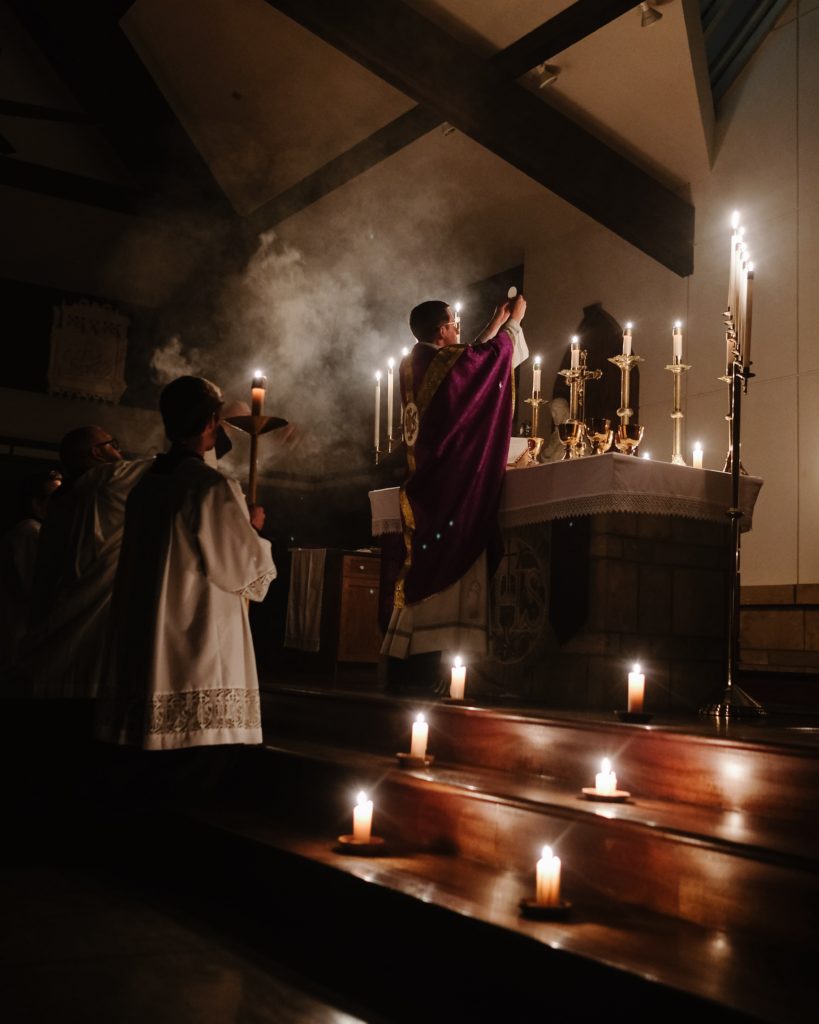
Published January 26, 2023
Cardinal Robert McElroy of San Diego has penned a lengthy reflection (available here) on how the synodal process might address the exclusion of certain categories of people. The essay covers a lot of ground, but the bulk of it is concerned with the questions of how to address, “the exclusion of divorced and remarried and L.G.B.T. Catholics, particularly on the issue of participation in the Eucharist.”
Reading the essay, I couldn’t help but think of H. Richard Niebuhr’s famous line: “A God without wrath brought man without sin into a kingdom without judgment through the ministrations of a Christ without a cross.” Which is to say: this was in no way an edifying document.
Where to begin?
While pastoral in tone, the essay deals almost entirely in abstractions. Concrete acts by particular moral agents simply don’t register. Exclusion is treated not as a consequence of sin, but as something inflicted upon sinners by the Church. Sin is not what divides us; the Church’s hang-ups about sin do.
So we read, for example, “[T]he exclusion of men and women because of their marital status or their sexual orientation/activity is pre-eminently a pastoral question, not a doctrinal one.”
The Church has gone to great lengths to insist that no one is excluded from receiving the Eucharist because of sexual orientation, which Cardinal McElroy surely knows. But even as he attempts to collapse the distinction between sinner and sin, McElroy draws a bright line between the moral life and our relationship with God, just as he does between pastoral and doctrinal matters. He writes:
The heart of Christian discipleship is a relationship with God the Father, Son and Spirit rooted in the life, death and resurrection of Jesus Christ. The church has a hierarchy of truths that flow from this fundamental kerygma. Sexual activity, while profound, does not lie at the heart of this hierarchy. Yet in pastoral practice we have placed it at the very center of our structures of exclusion from the Eucharist. This should change.
It is true that sexual morality is not at the heart of the hierarchy of truths of the faith in precisely the limited sense that no moral teaching of the Church is at the heart.
Of course, the reason God gives us the moral law is precisely to guide us toward those actions and habits that bring us closer to Him and to our neighbor, and to avoid those actions that impede, damage, and destroy those same relationships.
This is why Jesus says, “If you love me, you will keep my commandments.” And why, shortly before equating lust with adultery, he gave his disciples this warning:
Whoever breaks one of the least of these commandments and teaches others to do so will be called least in the kingdom of heaven. But whoever obeys and teaches these commandments will be called greatest in the kingdom of heaven. I tell you, unless your righteousness surpasses that of the scribes and Pharisees, you will not enter into the kingdom of heaven.
The actual words of the Scripture stand in jarring contrast to the disjointed view of doctrine and pastoral concerns, as Cardinal McElroy presents them. Curiously, the essay’s only reference to Scripture, such as it is, is to the title of a Synod document which is taken from Isaiah: “Enlarge the Space of Your Tent.” Not incidentally, Scripture scholars say this really refers, not to “inclusion,” but the territorial expansion of Israel, i.e., conquest.
For his part, the Cardinal is concerned that the Church places too much emphasis today on sexual morality. Were it not for the utter collapse of marriage in the West, the malformation and perversion of a whole generation of young people through pornography, the daily reminders that our gnostic culture promotes a view of the human person which renders the body meaningless and the Incarnation incoherent, and the Church’s own decades of failure to adequately address sexual abuse, he might have a point.
Cardinal McElroy has often expressed concern about polarization in the Church and has long been a critic of various notions of individual autonomy that mark American culture. Yet when it comes to reception of the Eucharist, that most inextricably communal reality in Christian life, McElroy stakes out a maximalist view of individual conscience: “While Catholic teaching must play a critical role in the decision making of believers, it is conscience that has the privileged place. Categorical exclusions undermine that privilege precisely because they cannot encompass the inner conversation between women and men and their God.”
As I’ve written before, nowhere is the individualist strain in American Catholicism more manifest than in the ubiquitous belief that reception of the Holy Eucharist is a private matter rather than a fundamentally ecclesial reality. Here we see it from Cardinal McElroy in its starkest form.
So diminished is the ecclesial dimension of the Eucharist in favor of private conscience, that one could easily miss McElroy’s call for open communion: “[T]he church must embrace a eucharistic theology that effectively invites all of the baptized to the table of the Lord. . .”
Unsurprisingly, the very thing Christ died to save us from – sin – barely registers in the Cardinal’s essay. Nor do we read anything about that beautiful Sacrament by which Christ offers us a remedy for even the gravest of sins. In some 3,000 words on the pastoral urgency for inclusion, the Sacrament of Reconciliation is not mentioned even once.
Sin, mercy, conversion, redemption: all these dissolve into flaccid platitudes about inclusion, listening, dialogue. Behind this fog of abstractions and platitudes, the fundamental drama of salvation – the very substance of the Good News – is obscured.
What we’re left with is a vision of Christian life which lacks any hint of the freshness of the Gospel. If that’s the path the synod takes, it will be a path to nowhere. And all of us, not least those in the difficult pastoral circumstances Cardinal McElroy is so genuinely and admirably concerned about, will be the worse for it.
Stephen P. White is a fellow in the Catholic Studies Program at the Ethics and Public Policy Center. Mr. White’s work focuses on the application of Catholic social teaching to a broad spectrum of contemporary political and cultural issues. He is the author of Red, White, Blue, and Catholic (Liguori Publications, 2016).
Photo by Josh Applegate on Unsplash
Stephen P. White is a fellow in the Catholic Studies Program at the Ethics and Public Policy Center. Mr. White’s work focuses on the application of Catholic social teaching to a broad spectrum of contemporary political and cultural issues. He is the author of Red, White, Blue, and Catholic (Liguori Publications, 2016).











